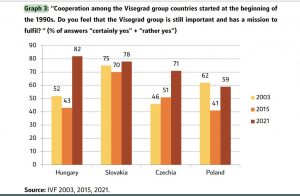László Kövér calls the Czech parliament's speakers remarks about Hungary "untruthful and disrespectful".Continue reading
The Czech government’s narrative about recent protest against curbs on the freedom of speech and the country’s involvement in the war in Ukraine as nothing more than the voice of a vocal fringe minority might not stand the test of time. As reported by MA7.sk the current government of Petr Fiala has received the worst rating in ten years from the public in the latest national opinion poll published on Wednesday.
While the Czech mainstream media is dutifully identifying the crowds of thousands of citizens protesting on Prague’s main Wenceslas Square as pro-Russian mob and describe one of the main organizers of the protests, PRO politician Jindřich Rajchl as an extremist, it seems ordinary citizens have their opinion of their own.
According to a nationwide survey conducted by the CVVM academic polling institute from mid-January to mid-March, as reported by the CTK news agency,
the majority of Czechs are dissatisfied with the government’s program, activities, composition and with Prime Minister Petr Fiala himself. The government’s communication with the public received a similarly negative assessment.

Featured Photo: Facebook Právo Respekt Odbornost – PRO – Ústecký kraj
The last time Petr Nečas’ government was rated so poorly by Czechs was in February 2013. That government faced a serious crisis in mid-2013 and submitted its resignation after a police raid on the cabinet’s headquarters. The caretaker cabinet led by Jirí Rusnok, which succeeded the Nečas government, and the two governments of Bohuslav Sobotka, with a social-democratic majority, and Andrej Babis, the most recent former prime minister much vilified by the press, both received better public ratings than the five-party coalition government led by Petr Fiala, which took office last January.
Only 24 percent of those polled were satisfied with the personnel composition of the Fiala cabinet, while 71 percent were dissatisfied. This could be a hint that the coalition with the tiny radical left-wing Pirate party, that has two ministers despite only having four MPs in parliament, is not going down well with mainstream, centrist voters.
32 percent of the population rated the Prime Minister’s work positively, while 64 percent rated it negatively. The government’s work over the past year and a half was rated as dissatisfactory by 69 percent of respondents, and only 27 percent were satisfied. The government’s program was rated as good by 30 per cent and bad by 59 per cent. 66 percent of people were dissatisfied with the government’s communication with the public and 33 percent were satisfied.
Compared with the results of a survey conducted in the last months of Andrej Babiš’s coalition government (ANO and CSSD), the average number of people dissatisfied with the new government’s work has increased by 15 percent. Only the ratings of the prime ministers in the two surveys are close.
In the summer of 2021, 62 percent of respondents were dissatisfied with the ANO president Andrej Babiš and 64 percent with Petr Fiala, president of the Civic Democratic Party (ODS). According to the CVVM’s assessment, disapproval of the coalition government led by Petr Fiala is growing, as illustrated by the tens of thousands of protests in Prague in recent months.

Viktor Orbán (L) and Petr Fiala, Versailles, 2022. Photo: MTI/Miniszterelnöki Sajtóiroda/Fischer Zoltán
Many Czech’s are not only dissatisfied with their government’s stance on the war in Ukraine, such as direct weapons shipments, but by the fact that expressing a disagreement with a pro-Ukrainian stance has been criminalized. People who allegedly express pro-Russian views are charged under an act against the glorification of extremist ideologies, which has prompted many to demonstrate for what they see as an attack on the freedom of conscience and speech. To date nine people have been convicted of expressing pro-Russian sympathies, 58 people have been charged, while criminal investigations have so far been launched in 90 cases.
The growing discontent with Petr Fiala’s pro-Atlantic and Europhile government might also prompt it to re-focus on closer regional co-operation, such as the Visegrad 4 alliance (Slovakia, Hungary, Poland, Czechia). The cooperation that is today widely regarded as in a state of hibernation due to Hungary’s refusal to support Ukraine with weapons, or to turn the perspectives, for the unwillingness of the other three to accept Hungary’s refusal to supply weapons.

Photo: visegradgroup.eu
The Fiala government, with the support of the newly inaugurated President Petr Pavel, has invested its main political capital in its pro-EU and US alignment, whilst at the same time ordinary Czechs are the most Eurosceptic among all the V4 nations. Furthermore, as the Graph above shows,
almost three quarter of Czechs are supportive of the V4 regional alliance, and the numbers are showing a growing trend.
This could not be said about their political representatives, whose recent communications regarding the viability of the V4 alliance largely range from the skeptical or lukewarm to the outright hostile.
Although the publication of unfavorable numbers is unlikely to result in a change of course for the current Czech political establishment, the worsening polls might refocus Petr Fiala’s mind to matters that the average Czech holds important, rather than investing further in Prague’s ideological alignment with Brussels and Washington.
Featured Photo: